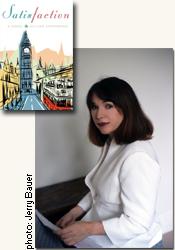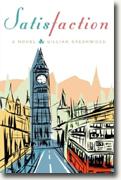author interview
book reviews:
· general fiction
· chick lit/romance
· sci-fi/fantasy
· graphic novels
· nonfiction
· audio books
· author interviews
· children's books @
curledupkids.com
· DVD reviews @
curledupdvd.com
newsletter
win books
buy online
links
home
for authors
& publishiss
for reviewers

|
|||||
 
Michael Leonard interviewed Gillian Greenwood, author of Satisfaction Interviewer Michael Leonard: Satisfaction Gillian Greenwood: Iíve always been intrigued by the extent to which Ďwanting moreí can destroy peopleís lives, people who outwardly appear to have enough, indeed do have enough - enough money, enough love - though clearly in the novel, and in life, there are people for whom nothing feels enough and the moral journey is to come to terms with that.
The novel is about marriage and family, but the theme of friendship also has a powerful energy that echoes throughout. What are you ultimately trying to say about the true nature of friendship? I have the impression that people think that for the most part that friendship either is, or should be, uncomplicated, but I donít think thatís always true, and in acknowledging the complications that do exist, the friendship is often deeper. Also marriage is another kind of friendship. A marriage can be satisfying for a long time without much other than friendship going for it, but a marriage without friendship is intolerable.
Satisfaction I didnít originally. I began the book by writing the story of the week, which forms the core of the narrative. But I became very interested in Patrick, and I felt the curiosity of my character Amy, as to what had gone on between Patrick and James. It also seemed to work as a way of unfolding their family story.
I think she means that she has finally found happiness and satisfaction and that it frightens her. After what she has been through, and the guilt that has caused her, it feels almost excessive. Itís this that prompts her confession. She has to confess and confide in order to try to get some assurance. Itís interesting that you use the word Ďconfessí, because I think she is seeking some sort of absolution, as if from a priest. Amy's confusion and feelings of discomfort seem in be ever present throughout, especially over her hesitancy to tell James about her unexpected pregnancy, her feelings towards Archie when she finds out he may have testicular cancer, and her inability to heal the rift with her twin sister Thea. How do these thoughts block Amy's capacity to move forward with the rest of her life? Well, they are paralyzing. She has reached a crisis point in her life when it seems pointless in many ways, despite its outward trappings. She doesnít seem to be able to feel the goodness of the experience she in fact inhabits. This seems to me to be a common problem. We sometimes label it a form of depression now, but it seems to be part of the modern experience, a sort of deadening. One-way of breaking through it is some sort of shock. Amy and Archie have always been close friends, at times almost teetering on sexual. Even at Amy and James' wedding, Archie is described as having a "late moment of lust," while watching her marry. And over the years Amy has been ever present in Archie's life. What do you think Amy gets out of her friendship with Archie that she doesn't get from her marriage to James? Archie is the Ďbad boyí whom Amy would never have been foolish enough to take on, unlike her sister. But her friendship with him provides her with a sort of fantasy other life. He is like an Elizabethan courtier who goes off to sea and brings back treasures and adventurous stories for his unattainable Queen. In her period of crisis, however, she loses perspective and the fantasy spills over. Similarly, Archie and James are also close and have been since their school days. Although their relationship was once shrouded in a kind of sexual ambivalence, what do you think lies at the core of their friendship? They have looked out for each other since they were boys. Archie started by protecting James, but that role reversed without Archie really knowing or acknowledging it. I donít think that their relationship was ever sexually ambivalent. The housemaster at their English boarding school is nervous of the closeness of their friendship, but thatĎs because homosexuality is common in such schools (though more usually between an older and younger boy).
Archie is a charming character, albeit brilliant, hedonistic and curious, and he possesses a willingness to take risks, particularly with regard to business, even when the risks don't really pan out exactly the way he wants. Does his way of looking at the world make him more of a challenge to his friends, particularly to James and Amy? Yes, but itís that very challenge that makes him so appealing to them. He brings a maverick quality into their lives. There is a downside, of course, and thatís what tests them. You make a point of portraying Thea as a type of direct opposite to Amy. Thea has chosen to follow a high profile career path in Los Angeles while Amy has turned to marriage, family and motherhood. Despite Thea's academic superiority and her intense sexuality, she comments that Amy "usually wins out." Why do you think this is so? Amy has an inner determination that can ultimately take her through anything, despite crises and tragedy. She is also pragmatic. I donít think she and Thea are direct opposites (though they are different in the ways you describe). They share a way of perceiving the world, which is why they fight. But Thea is less grounded. Itís also Theaís perception that Amy always wins out. Itís not necessarily true. Thea has always felt that Amy is ahead.
Yes. They are more alike than not. But there is vulnerability in Thea, which is lacking in Amy, and a tendency towards self-destruction. These are what give her a greater sexual charge. Everyone seems to have an ambivalent relationship with Richard Armstrong. The scene where Richard visits his mother in Brighton paints him in an unusually sympathetic light. Did you want Richard to imbue our compassion? And why does Richard hurriedly tell his mother that Thea is his girlfriend? Richard in some ways is the most understandable figure in the book. The complaining of his friends exasperates him. His own background is not nearly so privileged. He thinks he is clear about what he wants, but surprises himself in the end.
Out of all the characters, Lucy seems to be the most psychologically fragile and even a bit emotionally detached from her family, at one stage she claims, "not to understand any of her children's ambitions." She chooses instead to take solace by attending to her roof garden. Why do you think Lucy is brittle and emotionally delicate? She has buried her guilt. The only way she could live with herself was to reinvent herself as someone who refuses to countenance any darkness in life, someone who is determined that all around them is positive and affirming Ė the sort of thing preached by some new age gurus. The problem with this approach is that while a little positive affirmation may be no bad thing, as opposed to unrelenting cynicism, to take it to extremes leads to a particular kind of isolation Lucy cannot allow people to be themselves around her. At first, Grace seems to be everyone's confidante and muse. She's the first person Amy tells about the pregnancy and then the recipient of James' sexual fantasies. In fact, she seems to have everything, she's even going out with a young blond hunk that everyone thinks is gorgeous. But Grace also feels somewhat unmoored. What lies at the source of Grace's dissatisfaction? Well itís a family trait for one thingÖ. these three women have had a difficult upbringing. They have had parents who love but either absent or unavailable to them, for the reasons I stated in my answer to the previous question about Lucy, their mother. Grace is ambitious, but at a difficult moment in her career. She is potentially successful but it could all go wrong. We see most of the characters at a turning point. Thatís when the cracks show. You seem to be able get right to emotions of all of your characters, including sections where each character briefly reflects on their past even as they ponder their future. How hard was it create such fully fleshed out and three-dimensional people while also integrating so much of their past lives into the narrative? To be honest, very hard, and Iím glad you think I succeeded. Getting the balance between giving the information required to make sense of what has led to the emotional quandary these people find themselves in, and keeping the narrative moving required, for me at least, endless rewriting! If you spend too much time on the Ďback storyí, the reader gets frustrated. If you donít give enough, it feels shallow. London is an incredible city and comes across as the perfect setting for an intricately character driven story such as this - indeed it almost feels like an extra character. What especially appeals to you about London as the focus for the story? It appeals to me because I know it. Iíve lived here for many years. Iím rootless other than London so itís my home. Itís simply an amazing city and I will go on writing about it. Whatís fascinating about it too is the way it has changed just in the time I have lived here, let alone over the centuries. Itís so very different from area to area; itís a string of villages, even in the centre, all built on history. Itís a microcosm of the globe. Shame and hurt and betrayal are all huge forces that resonate throughout Satisfaction I think itís what we do to try to compensate for those forces, which might be most recognizable, for often weíre unable to acknowledge the forces you mention. These characters mostly try to grasp on to things, try to get more of whatever it is they want, try to find something to make themselves feel better without knowing most of the time what the problems
are.
Satisfaction Thank you for the comparison. My favourite contemporary writers are in fact mainly American. I love Anne Tyler, Jonathan Franzen, Siri Hustvedt and the late Richard Yates. In the grander scheme of things I love Chekhov, and Russian literature in general. I also love the pre and just post war English novelists, Evelyn Waugh and Graham Greene. I think they made me want to write, even though my work is nothing like theirs. I like the morality at the core of their books. And finally, with your debut novel now behind you, what is next on your agenda? Is there another novel in the works, and if so, would you like to share something of it with us? Yes, Iím close to finishing my second book. I donít think I have enough perspective on it yet to tell you what itís about, other than that it looks at the way several lives can be controlled by someone who is dead, and how we substitute new sets of belief for the old ones that many of us have lost. Gillian Greenwood was educated at Oxford University. She became editor of the Literary Review in her twenties, and then worked in arts television. She is currently executive producer of the South Bank Arts Show, and she lives in London. Satisfaction Michael Leonard is a freelance writer and contributing reviewer to curledup.com. His interview of Gillian Greenwood was written in conjunction with his review of Satisfaction. Michael Leonard/2007.
|
|||||
| fiction · sf/f · comic books · nonfiction · audio newsletter · free book contest · buy books online review index · links · · authors & publishiss reviewers |
|
| site by ELBO Computing Resources, Inc. | |


